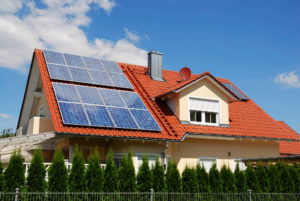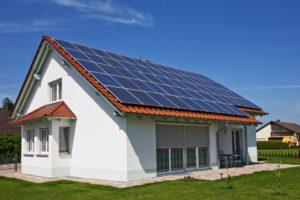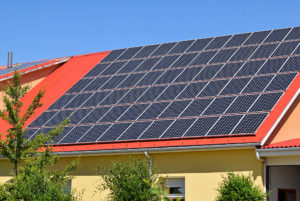Selling a house with solar panels presents a unique opportunity for homeowners to leverage clean energy as a selling point. However, navigating the process can be daunting. This guide provides valuable insights and tips for selling a home with solar panels, highlighting the benefits and addressing potential obstacles.
Contents
- 1 Key Takeaways
- 2 Why Solar Panels are a Selling Point
- 3 Understanding Ownership: Owned Solar Panels vs. Leased Solar
- 4 Selling Your Home with Solar Panels: Key Considerations
- 5 Overcoming Obstacles to Selling a House with Solar Panels
- 6 Case Study: Successfully Selling a Home with Solar Panels
- 7 Expert Insights From Our Solar Panel Installers About Selling a House with Solar Panels
- 8 Experience Solar Excellence with Us!
- 9 Conclusion
Key Takeaways
- Selling a house with solar panels offers environmental and financial benefits, attracting eco-conscious buyers and potentially increasing the property’s value.
- Understanding ownership options, whether owned or leased, is crucial in effectively marketing the solar panel system to potential buyers.
- Overcoming transferability and financing concerns and addressing buyer concerns through education and transparency are essential for successfully selling a house with solar panels.
Why Solar Panels are a Selling Point
Solar panels have become increasingly attractive in real estate, offering numerous benefits for sellers and buyers. Let’s explore in greater detail why solar panels are a compelling selling point.
Environmental and Cost Savings
One of the primary reasons solar panels are highly sought-after is their positive impact on the environment and potential cost savings for homeowners. By harnessing clean, renewable solar energy, solar panels reduce reliance on fossil fuels, lowering carbon footprints and contributing to a greener future. Sellers can emphasize these environmental benefits, appealing to eco-conscious buyers.
Furthermore, solar panels significantly reduce energy costs over the long term. Homeowners can experience substantial savings on their utility bills by generating their electricity. These savings can appeal to potential buyers mindful of their energy expenses. Sellers should highlight the potential for reduced energy costs as a compelling reason to invest in a solar-powered home.
Increased Home Value
Another significant advantage of selling a house with solar panels is the potential increase in property value. Studies consistently show that homes with solar panels have higher resale values. Buyers recognize the long-term financial benefits of solar energy and are often willing to pay a premium for a home with an existing solar panel system.
Solar installations not only provide ongoing energy savings but also enhance the overall desirability of the property. The presence of solar panels demonstrates the homeowner’s commitment to sustainable living and positions the house as a forward-thinking investment. By showcasing the added value of solar panels, sellers can attract potential buyers interested in long-term energy savings and environmentally conscious living.

Understanding Ownership: Owned Solar Panels vs. Leased Solar
Understanding the different ownership options is essential when selling a house with solar panels. Let’s delve deeper into the benefits and considerations of both owned solar panels and leased solar systems.
Owned Solar Panels
Selling a house with owned solar panels gives homeowners more control and flexibility. Potential buyers may be attracted to owning the solar panel system outright, as it offers several advantages.
Firstly, owners of solar panels can take advantage of various financial incentives and tax credits. These incentives can significantly offset the initial investment and lower the payback period, making the property even more attractive to potential buyers.
Secondly, owning the solar panel system grants homeowners complete autonomy and control over their energy production. They can monitor and optimize their energy consumption, store excess energy in batteries during peak times, and potentially sell surplus energy back to the grid. Enjoying these benefits without being tied to a lease agreement can be a strong selling point.
Leased Solar Panels
For homeowners who have opted for a solar lease or power purchase agreement (PPA), selling a house with leased solar panels requires additional considerations. Understanding the lease terms and effectively transferring the agreement to the new homeowner is crucial.
Solar leases allow homeowners to enjoy the benefits of solar energy without the upfront costs of purchasing a system. When selling a house with a leased solar panel system, sellers need to communicate the terms and conditions of the lease agreement to potential buyers. Buyers will want to understand the monthly lease payments, the duration of the lease, and any potential escalations in payment over time.
To ensure a smooth transition, sellers should gather all relevant documentation, including the lease agreement, payment history, and any associated warranties. Collaborating with the solar leasing company or installer can help streamline the transfer process and address buyers’ concerns.
While selling a house with leased solar panels may involve additional steps, it still offers the benefits of clean energy and potential savings on energy bills. Sellers should highlight the reduced energy costs and the environmental advantages associated with a solar lease, assuring buyers that the transition will be seamless and the benefits long-lasting.

Selling Your Home with Solar Panels: Key Considerations
Certain key considerations can help ensure a successful sale when selling a home with solar panels. Let’s explore these considerations in detail to help homeowners navigate the process.
Preparing for the Sale
Before listing your home, ensuring that your solar panel system is in optimal condition is essential. Schedule a maintenance check-up with your solar installer to inspect the panels, wiring, and inverters. Clean the panels to maximize efficiency and showcase their pristine condition to potential buyers.
Gather all necessary documentation related to the solar panel system. This includes warranty information, installation permits, maintenance records, and any financing or leasing agreements. Comprehensive documentation demonstrates your commitment to maintaining the system and gives buyers confidence in its reliability and performance.
Marketing and Highlighting Solar Panels
Effectively marketing your home’s solar panel system is crucial to attracting potential buyers. Highlight the benefits of solar energy in your listing descriptions, property brochures, and online advertisements. Showcase the potential energy savings, emphasizing the reduced reliance on conventional energy sources and the positive environmental impact.
Consider including specific information on the size and capacity of the solar panel system. Highlight the estimated monthly or annual energy bill savings based on historical data. This information allows potential buyers to understand the financial benefits they can expect from the solar panel system.
Additionally, emphasize the long-term value of the solar panel system as a selling point. Buyers will appreciate the opportunity to contribute to a sustainable future while enjoying the financial advantages of reduced energy costs.
Educating Potential Buyers
Providing potential buyers comprehensive information about your solar panel system can help address any concerns or questions. Be prepared to explain the benefits, maintenance requirements, warranties, and any associated monitoring systems.
Consider sharing historical energy consumption data, showcasing the savings achieved through the solar panel system. Provide estimates of the system’s lifespan, highlighting the durability and longevity of the panels. Sharing this information helps educate buyers on the value and reliability of the solar panel system.
Encourage potential buyers to ask questions and offer additional resources, such as contact information for the solar panel installer or any documentation from the manufacturer. Demonstrating transparency and offering support can help buyers gain confidence in the system and its benefits.

Overcoming Obstacles to Selling a House with Solar Panels
While selling a house with solar panels offers numerous advantages, it’s important to be aware of potential obstacles that may arise during the process. Here are some common obstacles and strategies for overcoming them:
Transferability and Documentation
When selling a house with solar panels, ensure you have all the documentation readily available. This includes warranty information, maintenance records, and transferable contracts or lease agreements. Buyers will want assurance that they can seamlessly take over the solar panel system and continue enjoying its benefits.
Consult with your solar panel installer or leasing company to understand the specific requirements and steps in transferring the ownership or lease agreement. A clear understanding of the process will enable you to confidently communicate the transferability of the solar panel system to potential buyers.
Financing Options and Assumable Loans
If your solar panel system was financed through a loan, explore the possibility of assumable loans. Assumable loans allow buyers to take over the loan payments and terms, simplifying the financing process. Highlight the advantages of assumable loans, such as reduced closing costs and potentially lower interest rates, to attract buyers interested in assuming the loan.
Work closely with your solar financing company to understand the options available and ensure a smooth transition for the buyer. Communicate the financial benefits and opportunities of assumable loans to make your solar-powered home even more appealing.
Addressing Buyer Concerns
Some buyers may have concerns about solar panel systems, ranging from maintenance requirements to potential changes in energy needs. Addressing these concerns proactively can help alleviate any doubts and showcase the value of your solar panel system.
Provide potential buyers with information on the system’s warranties and any available maintenance plans. Assure them that solar panel maintenance is minimal and involves periodic cleaning and inspections. Explain how the system operates and address misconceptions or common myths about solar panel installations.
Highlight the flexibility of solar panel systems to adapt to changing energy needs. Discuss the ability to add or expand the system if desired, accommodating future changes in energy consumption or adding electric vehicles. Emphasize that solar panel systems are scalable and can be customized to meet specific energy requirements.
Additionally, highlight the potential for net metering. Explain how excess energy generated by the solar panels can be fed back into the grid, resulting in credits or compensation from the utility company. This aspect offers buyers financial benefits and demonstrates solar energy systems’ adaptability and versatility.
By proactively addressing buyer concerns, providing accurate information, and showcasing the benefits and flexibility of solar panel systems, you can instill confidence in potential buyers and increase the appeal of your solar-powered home.
Case Study: Successfully Selling a Home with Solar Panels
Background
At Solar Panels Network USA, we assist homeowners in leveraging their solar investments when selling their properties. Recently, we helped a homeowner in California sell their house equipped with a solar panel system. This case study outlines our approach and highlights the benefits of selling a home with solar panels.
Project Overview
The homeowner was looking to move to a different state and wanted to ensure that the solar panel system added value to their property during the sale. They were concerned about potential obstacles, including explaining the benefits of solar energy to potential buyers and handling the transfer of the solar lease agreement.
Implementation
- Assessment and Preparation: We started with a comprehensive assessment of the solar panel system, ensuring it was in optimal condition. We scheduled a maintenance check-up, cleaned the panels, and gathered all relevant documentation, including warranty information, installation records, and the solar lease agreement.
- Marketing the Solar Benefits: We worked with the homeowner’s real estate agent to create marketing materials that highlighted the benefits of the solar panel system. These materials included details on energy savings, environmental benefits, and the increase in home value attributed to the solar panels. We also prepared a financial analysis showing the potential savings on utility bills.
- Educating Potential Buyers: During open houses and private showings, we provided prospective buyers with comprehensive information about the solar panel system. This included demonstrating the monitoring system, explaining the lease terms, and answering any questions about maintenance and energy production.
Results
The home’s solar panel system proved to be a significant selling point. The marketing materials and detailed financial analysis attracted eco-conscious buyers and those interested in long-term savings. The property received multiple offers, and the final sale price was above the initial asking price, reflecting the added value of the solar panel system.
Summary
This case study demonstrates how effectively marketing and educating buyers about the benefits of solar energy can enhance the value and appeal of a property. By highlighting the financial and environmental advantages, homeowners can attract a broader range of buyers and achieve a successful sale.
Expert Insights From Our Solar Panel Installers About Selling a House with Solar Panels
One of the main selling points of a home with solar panels is the potential for significant energy savings. Buyers are often attracted to the idea of lower utility bills and the environmental benefits of using renewable energy.
Lead Solar Consultant
When selling a house with leased solar panels, it’s crucial to have all lease documents ready and clearly explain the terms to potential buyers. Transparency helps in gaining their trust and ensures a smoother transaction.
Solar Leasing Specialist
Maintenance and efficiency are key aspects buyers consider. Make sure your solar panels are in top condition and provide documentation of regular maintenance to reassure prospective buyers.
Senior Solar Technician
Experience Solar Excellence with Us!
Trust in Solar Panels Network USA, where our seasoned experts deliver top-quality solar solutions for homes and businesses nationwide. With a legacy of countless successful installations and a commitment to sustainable energy, we’re your reliable partner in the solar journey. Ready for a brighter, eco-friendly future? Call us now at (855) 427-0058 and harness the power of the sun!
Conclusion
Selling a house with solar panels requires careful consideration and effective communication. By understanding the advantages of solar energy, preparing your solar panel system for sale, and effectively marketing its benefits, you can attract eco-conscious buyers who recognize the long-term financial advantages and positive environmental impact.
Addressing potential obstacles, such as transferability and financing concerns, demonstrates your commitment to facilitating a smooth buyer transition. By providing comprehensive information, addressing buyer concerns, and highlighting the value of solar energy, you can successfully sell your home and pass on the benefits of clean, renewable energy to a new owner.
Embrace the opportunity to sell your house with a solar panel system, positioning it as an environmentally conscious and financially attractive investment. With proper preparation, education, and transparency, you can showcase the advantages of solar energy and make your solar-powered home a highly desirable property in the real estate market.
About the Author
Solar Panels Network USA stands at the forefront of solar energy solutions, driven by a team of seasoned solar engineers and energy consultants. With over decades of experience in delivering high-quality solar installations and maintenance, we are committed to promoting sustainable energy through customer-centric, tailored solutions. Our articles reflect this commitment, crafted collaboratively by experts to provide accurate, up-to-date insights into solar technology, ensuring our readers are well-informed and empowered in their solar energy decisions.

